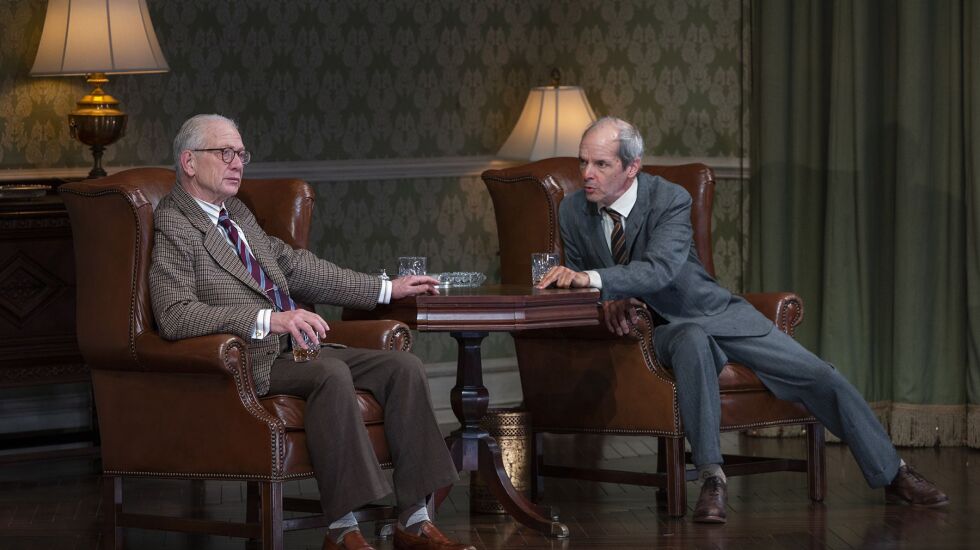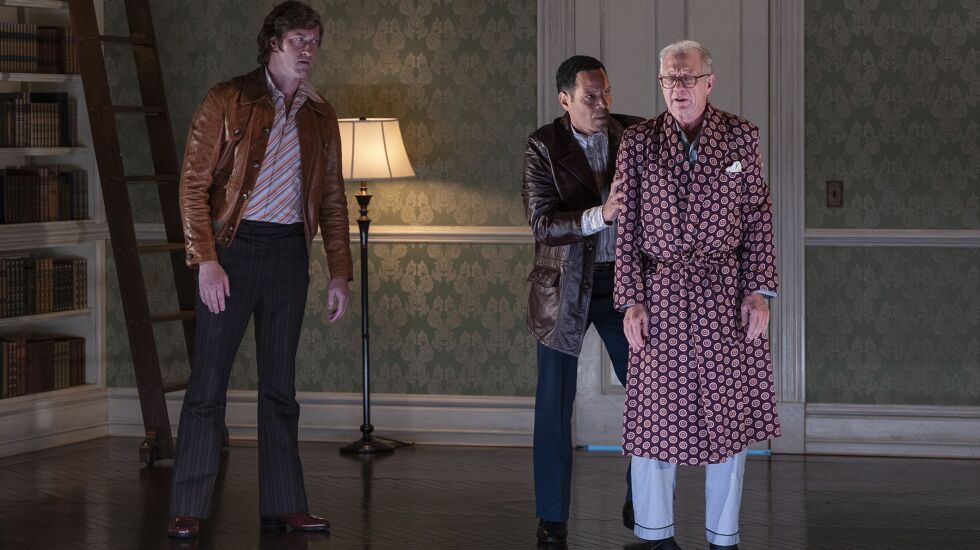
I have a favorite “New Yorker” cartoon, by Barbara Smaller. An interior designer empathetically shares with a client that “Of course, we could do spare and minimalist, but not on your budget.”
The joke is funny because it rings true: the less there is, the more perfect it needs to be. You can’t hide anything when everything stands out.
So it goes with the plays of Nobel Laureate Harold Pinter. He provides the language, including a plethora of planned pauses and some basic but often contradictory details of his characters. Plot, spare. Stage directions, minimalist to the extreme. But done properly his writing creates a sense of mystery and menace and sometimes desperation and despair. A razor-sharp wit and frequent shifts in power balances make his plays shockingly funny, especially given that there really aren’t any proper jokes in them.
Those qualities, that cryptic but compelling subtext that ignites the spareness, must be created by the actors under the director’s guidance. There is, quite literally, no way for the actors to hide anything, and Pinter’s words must be interpreted — but not over-interpreted! — to arouse meaning from the purposefully oblique. There are a lot of acting choices to make.
So imagine you’re an understudy for one of Pinter’s most demanding roles and, during previews, you need to step in permanently for a well-known actor whose anticipated performance was almost certainly a factor in selecting the play to begin with.
That’s the situation for understudy-now-lead actor Mark Ulrich in the Steppenwolf Theatre production of Pinter’s 1975 play “No Man’s Land.” In a truly impressive display of acting craft, Ulrich has taken on the role of Spooner — a sixtysomething, not-successful poet, equal parts charmingly self-deprecating garrulity and sketchiness — from Austin Pendleton, who departed the production recently for personal reasons.
Jeff Perry, one of Steppenwolf’s co-founders and also a raison d’etre for the production, plays the other lead, Hirst, described as a successful “man of letters.” That quality is emphasized in Andrew Boyce’s set design, which adds a beautiful wall of books to Hirst’s sparely furnished but grandly elegant room where the entire play takes place.

There is no plot proper unless you consider alcohol consumption a storyline. Hirst, also in his 60s, doesn’t like to drink alone, and so, either through invitation or just tagging along, Spooner has joined him for lots (and lots) of whiskey accompanied by conversation. Their dialogue — mostly Spooner at the start — bounces freely from subject to subject, sometimes via seeming non-sequiturs.
This is an abstract work, absurdist if you care to call it that, grounded in the realities of aging but equally informed by the instability of memories and dreams. Hirst may or may not know Spooner. At one moment, they refer to each other as strangers, at another as old university chums. Perhaps Hirst has dementia and Spooner just follows along, if you care to find a realistic interpretation. Or perhaps Pinter operates on multiple planes of reality. Either way, their real or imagined past becomes a source for some always entertaining Pinteresque power shifts, in this case emphasized by Janice Pytel’s costume choices, changing Hirst from a tweed jacket in Act I to a pin-striped power suit in Act II.
The aging lead characters are joined sporadically by two younger men, Briggs (Jon Hudson Odom) and Foster (Samuel Roukin), who seem to serve Hirst but also may be taking advantage of him. You spend the play wondering about everyone’s intentions, but always certain they aren’t selfless.
There isn’t, yet at least, the necessary lurking charge in the playful but precarious give-and-take between Perry and Ulrich. But Ulrich’s performance will mature as he has more time in the role, as he refines Spooner’s long monologues so that every word matters. That may well take this production to an even higher level.
Perry’s timing, with the benefit of full rehearsals, has been sharpened to deliciously comic effect, his expression of Pinter’s language — some of the very best of modern drama —bracingly nimble and crisp. The actor has mined the contradictions and consistencies in a character whose moods change drastically. And he makes some truly bold choices, include delivering part of a monologue, facing upstage, to the wallpaper.
What’s perhaps most surprising here is that the casting dynamics end up placing greater-than-usual emphasis on the supporting characters, and in this the production, under Les Waters’ direction, wildly excels.
Odom and Roukin bring layers of rich undercurrents to Pinter’s threatening friskiness. Odom is having a breakout year with very different but equally superb performances here and in “Toni Stone” at the Goodman Theatre. And the English actor Roukin truly raises the level of cultural authenticity.
These two fine actors take charge for some of the final moments, acing the Beckettian vaudeville bit and making us question whether this is a world of wordplay and nothing but.







